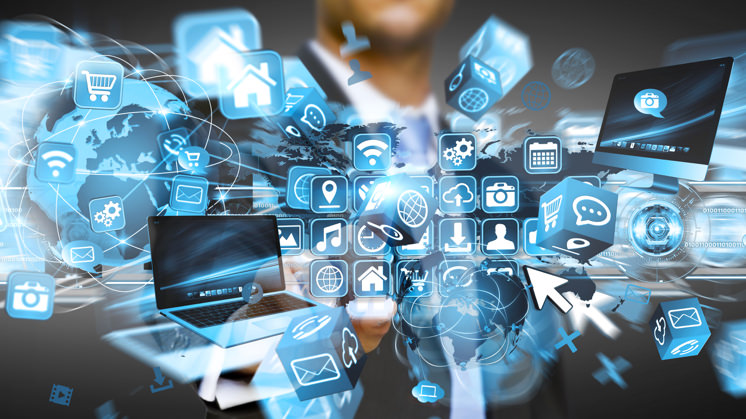Digital skills
Digital skills: are we ready for the digitisation of employment?
The labour market demands digital skills, workers who are not only fluent in other languages or their academic speciality but in the essential tools to deal with fluency in the technological age. We mean knowledge about electronic devices, networks, cybersecurity, communications systems and data analysis, among other things.

New digital professionals
The days of listing a knowledge of office software as an indispensable extra on a CV have gone. The technological revolution is creating new professions and workers need digital skills so as not to be left behind. The European Centre for the Development of Vocational Training (Cedefop) believes that in the near future 90% of vacancies in Europe will require some type of digital knowledge.
The Global Skills Report confirms the increase in investment in digital skills. More than 80% of large Spanish companies are investing in training their employees and Switzerland is the top country globally, with Japan in second place. Spain is ranked seventh.
Most in-demand digital skills
Although computer security is a complex field, we should at least have a basic knowledge.

Companies value proficiency with third-party service tools, such as CRMs or social media.

Knowing how to sell and manage the contents of a blog is another of the most valued digital skills.

It is not enough to upload photos and post. We need to learn how to build a strategy on Twitter, Facebook, etc.

Editing and delivering valuable content through infographics or tutorials will always be highly valued.

Using cloud-based tools with ease or knowing something about e-commerce is already essential in many companies.

Handling data analysis or business management programs will be a great help in finding you a job.

Understanding how a search engine works so that our contents fit in amongst the top results

 VIEW INFOGRAPHIC: Most in-demand digital skills [PDF] External link, opens in new window.
VIEW INFOGRAPHIC: Most in-demand digital skills [PDF] External link, opens in new window.
What are digital skills and what are they used for
Digital skills are not just about learning and developing technological skills. They also involve the acquisition of knowledge, values, attitudes, regulations and ethics about ICT so as to get the most out of technology. In addition, they involve thinking and the responsible use of the data obtained through the use of technology.
In the workplace there is a close relationship between a lack of digital skills and difficulty finding work: digitisation enhances our personal and professional skills, and that gives us more options when it comes to getting a job.
Digital skills allow us to:
-
Optimize times and costs. This would mean the delivering projects before the deadline and with the pre-set quality parameters, and respecting the original budget and requirements.
-
Understand the potential of interactive electronic devices such as smartphones, tablets and laptops, incorporating new digital routines into our professional work.
-
Increase the pace of reflection, creativity and innovation. Digital skills use technological tools that speed up innovation and make us more productive, more flexible and better able to react and anticipate the unexpected.
-
Manage corporate digital identity in a meaningful way. Digitisation provides us with knowledge, business intelligence and competition analysis, giving us a criterion for driving information and helping brand positioning.
-
Improve effectiveness and work efficiency. Digital skills help us work as a team without having to rely on a physical space. Electronic devices and media encourage coordination and collaborative environments.

Digital transformation
Digitalisation is an indispensable ally to overcome the challenges in the current context.

Digital divide
Digital divide throughout the world and why it causes inequality.

Professions of the future
Which are the professions of the future?
Most in-demand digital skills
-
Cybersecurity
Although computer security is a complex field, we should at least have a basic knowledge.
-
Customer service
Companies value proficiency with third-party service tools, such as CRMs or social media.
-
Marketing
Knowing how to sell and manage the contents of a blog is another of the most valued digital skills.
-
Social media
It is not enough to upload photos and post. We need to learn how to build a strategy on Twitter, Facebook, etc.
-
Digital image and video editing
Editing and delivering valuable content through infographics or tutorials will always be highly valued.
-
Cloud technology and e-commerce
Using cloud-based tools with ease or knowing something about e-commerce is already essential in many companies.
-
Specific software
Handling data analysis or business management programs will be a great help in finding you a job.
-
Web positioning
Understanding how a search engine works so that our contents fit in amongst the top results.
Digitisation, a new impetus for equality
Unesco focused its Mobile Learning Week 2018 in Paris on the importance of digital skills as drivers of social inclusion. The inequalities in this area are evident to this international organisation, which denounces discrimination of access to technological knowledge in the world because of socio-economic, racial, educational and gender reasons.
Some NGOs, such as Plan International, which look after children's rights and gender equality, claimed in 2017 that girls were five times less likely than boys to study for a technological degree. According to this organisation, Africa was the most unequal continent in the world in digital gender issues, with a gap of 23% compared to 2% in the Americas.
In the case of Europe, the Eurostat agency published data for 2017, which also showed a digital divide by gender. While 60% of Europeans between 16 and 74 years old have mastered basic digital skills, only 55% of European women in the same age group have done the same.
Technology should not be a reason for exclusion but rather a tool that empowers us, one that helps us to overcome adversities and discover new opportunities. Education in digital skills is, without a doubt, the best way to overcome this challenge. Digitisation is not at odds with social and economic progress. On the contrary, it must bring us prosperity, social equality and, ultimately, a more competitive economy. External link, opens in new window.




